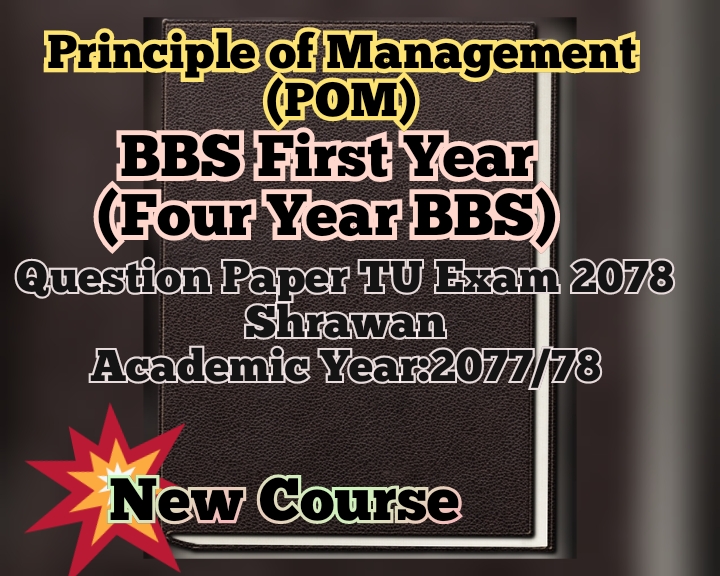Principles of Management ( Pom: MGT 213) Questions Paper 2078/ Shrawan BBS First TRIBHUVAN UNIVERSITY
TRIBHUVAN UNIVERSITY
Academic Year: 2077/78
Exam Date: 2078/ Shrawan
B.B.S.4 Yrs. Programme/1 Year /MGMT Principles of Management (MGT 213)
Full Marks: 100 Time: 3 hrs.
MGT: 213 (Regular)
Candidates are required to give their answers in their own words as far as practicable. The figures in the margin indicate full marks.
Attempt ALL questions.
Brief Answer Questions 10*2=20
- What does effective goal mean?
2. Put light on ‘scalar chain’ principle of management.
3. Show acquaintance to learning organization.
4. State any four areas of social responsibility.
5. List any two factors necessary for a successful MBO program.
6. Enlist two differences between organic and Mechanistic organization.
7. Write the names of four export oriented industries in Nepal.
8. Write down four barriers of communication.
9. List any two reasons of incompatibility of multinational companies to the least developed economy like Nepal.
10. State any four tools of total quality management (TQM).
Group “B”
Descriptive Answer Questions
Attempt any FIVE questions. [5×10:50]
11. What is goal succession? Give an appropriate example of goal succession.
12. Explain contingency theory of management. Do you think contingency theory is superior than scientific management theory? Explain.
13.Why does strategic planning essential to an organization? Describe the fundamentals of strategic planning.
14. Define centralization and decentralization. Which approach is appropriate to the family owned small business? Give reasons.
15. Enumerate the major problems of business in Nepal.
16. Define communication. How can an organization enhance effective communication? Explain.
Group “C”
Analytical Answer Questions
Attempt any TWO questions. 2*15=30
- Business environment analysis is essential for the successful operation of business in future. Discuss the statement based on economic and socio-cultural environment.
- Previously people used to think that conflict is harmful to the organizations. But nowadays, managers of the corporate houses argue that conflict is essential to make an organization innovative. In which argument do you agree and why? How can managers solve when they face conflicting situation in their organization?
- The major problem of the Nepalese business organization is inability of maintaining quality of the products. Do you think that Deming’s principles of quality management can help to solve the problem of quality inconsistency in the Nepalese business organizations. Explain.

